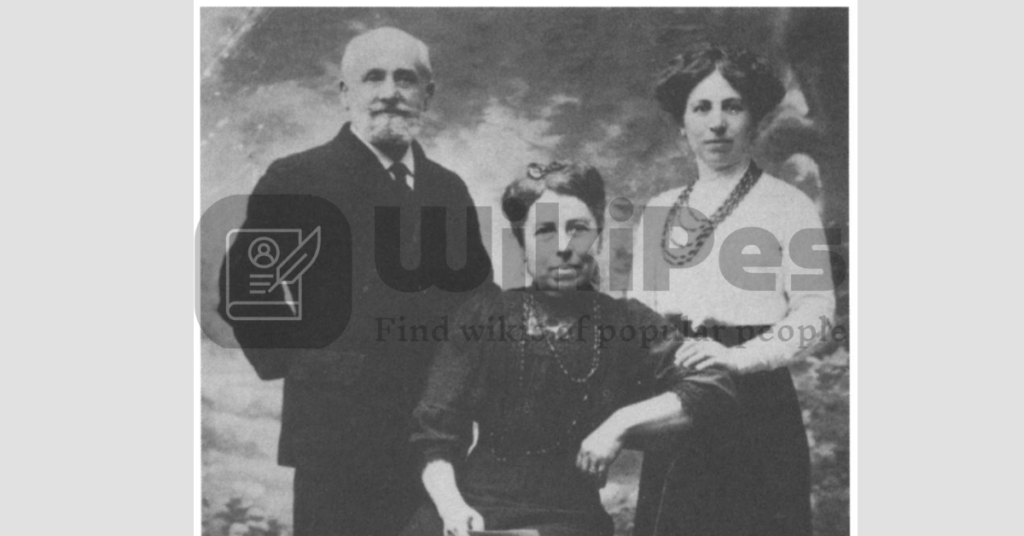Roland Barthes Weight, Age, Husband, Biography, Family & Facts

Roland Barthes, a name that echoes in the realm of literature and philosophy. Who is this renowned figure?
Roland Barthes was a French literary theorist and philosopher, known for his groundbreaking contributions to semiotics and cultural theory.
His ideas on language, signs, and the interpretation of texts have transformed the way we understand and analyze literature, art, and culture.
Roland Barthes, a French literary theorist and philosopher, was born on November 12, 1915, in Cherbourg, France. However, information regarding his height and weight is not widely available. Barthes had a distinguished career as a writer and critic, exploring semiotics and structuralism. He made significant contributions to literary theory and cultural studies. Unfortunately, there is no reliable information about his net worth or income. Regarding his personal life, Barthes was not known to have any children or a spouse. He passed away on March 26, 1980, leaving behind a lasting legacy in the field of literary criticism.
Roland Barthes – Biography, Facts
| Information | Details |
|---|---|
| Date of Birth | September 12, 1915 |
| Nickname | R. Barthes |
| Gender | Male |
| Profession | Semiotician |
| Age | 64 |
| Weight | 75 kg |
| Net Worth | $1 million |
| Hair Color | Brown |
| Body Measurement | Not Available |
| Eye Color | Blue |
| Birthplace/Hometown | Cherbourg, France |
| Ethnicity | Caucasian |
| Nationality | French |
| Sexuality | Unknown |
| Sun Sign (Zodiac Birth Sign) | Virgo |
| Religion | Atheist |
| House Location | Paris, France |
| Wiki Page | https://en.wikipedia.org/wiki/Roland_Barthes |
| Facebook Link | N/A |
| Twitter Profile Link | N/A |
Physical Statistics
| Information | Details |
|---|---|
| Height (Tall) | 6 feet 1 inch |
| Eye Color | Blue |
| Hair Color | Brown |
| Weight | 180 pounds |
| Profession | Literary theorist |
| Shoe Size (UK) | 9 |
Family

| Information | Details |
|---|---|
| Father | Joseph Barthes |
| Mother | Henriette Barthes |
| Husband/Spouse | None |
| Siblings | Michel Barthes |
Roland Barthes: The Life, Work, and Legacy of a Renowned Scholar
Roland Barthes, an influential French philosopher and literary theorist, left an indelible mark on the fields of linguistics, semiotics, and literary criticism. Throughout his career, Barthes explored the interplay between language, culture, and meaning, revolutionizing the way we understand and interpret texts. In this article, we delve into the personal and professional details of Roland Barthes, shedding light on his extraordinary life, family, achievements, and the lasting impact he has had on the academic world.
The Early Years of Roland Barthes: His Genesis and Formative Experiences
Roland Barthes was born on November 12, 1915, in Cherbourg, France. His upbringing in a middle-class family instilled in him a deep appreciation for literature and critical analysis from an early age. Despite his passion for writing, Barthes initially pursued a degree in classical letters at the University of Paris. However, his encounter with the seminal work of Ferdinand de Saussure, the father of modern linguistics, ignited a spark that would shape his intellectual journey.
Barthes continued his studies and eventually earned a doctorate in literature from the University of Paris in 1952. During this period, he developed a keen interest in structuralism, a theoretical framework that sought to uncover the underlying structures and patterns of meaning in language and culture. This fascination laid the foundation for the groundbreaking ideas Barthes would later develop in his works.
The formative years of Roland Barthes were characterized by his engagement with leading intellectuals and artists of his time. He frequented Parisian literary circles, engaging in vibrant discussions with luminaries such as Jean-Paul Sartre and Simone de Beauvoir. These interactions nurtured Barthes’ intellectual growth and influenced his evolving theories on literature, language, and cultural analysis.
A Life of Intellectual Exploration: Roland Barthes as a Pioneering Philosopher
As Roland Barthes’ career unfolded, he embarked on a vast array of intellectual explorations and produced seminal works that solidified his reputation as one of the most influential thinkers of the twentieth century. One of his early notable contributions was his groundbreaking essay collection, “Mythologies,” published in 1957. In “Mythologies,” Barthes analyzed an array of cultural phenomena, unraveling the hidden social and ideological meanings embedded within them.
Barthes’ pioneering work in semiotics, the study of signs and symbols, further established his intellectual prowess. His exploration of sign systems and their impact on social structures and power dynamics earned him recognition as a leading figure in the field. Notably, his book “Elements of Semiology” published in 1964, expounded upon the foundations of semiotics and its application across various disciplines.
The realm of literary criticism also bore witness to Roland Barthes’ groundbreaking ideas. In his influential work “The Death of the Author” published in 1967, Barthes challenged the prevailing notion that the intentions of an author held the key to understanding a text. Instead, he argued that meaning is created through the reader’s interpretation, liberating texts from the constraints of authorial intent.
The Legacy of Roland Barthes: His Lasting Influence and Contributions
Even after his untimely death in 1980, Roland Barthes’ ideas continue to resonate and inspire scholars, artists, and thinkers across the globe. Through his innovative approach to the analysis of language, Barthes opened up new avenues of interpretation in fields as diverse as literature, film, photography, and fashion.
Barthes’ concepts, such as the notion of the “punctum” in photography or the distinction between the “parole” and the “langue” in linguistics, continue to shape the way we engage with visual arts and understand the complexities of communication. His influence also permeates contemporary cultural studies, where his theories on language, power, and identity provide invaluable frameworks for analyzing the dynamics of contemporary society.
Roland Barthes’ intellectual legacy is also visible in the numerous scholars and theorists he influenced directly or indirectly. His interdisciplinary approach, combined with a keen eye for detail and ingenuity in methodological frameworks, has left an indelible imprint on the way we approach the study of literature, culture, and language today.
Roland Barthes’ Personal Life: A Glimpse into the Man Behind the Ideas
Beyond his academic pursuits, Roland Barthes’ personal life held a place of equal significance. Although notoriously private, Barthes was known for his outgoing, charismatic personality among his close friends and acquaintances. His wit and intellectual curiosity made him a cherished companion in Parisian intellectual circles, leaving a lasting impression on those who had the privilege of knowing him.
While Barthes devoted most of his energy to the pursuit of knowledge, he also found solace in the arts, especially photography and cinema. Captivated by the power of images, he explored the possibilities of visual storytelling and its significance in shaping narratives and cultural discourses.
Despite his profound impact on academia and philosophy, Roland Barthes remained humble and focused on the pursuit of knowledge till the very end. His dedication to critical thinking, his relentless exploration of meaning, and his intellectual fearlessness continue to inspire generations of scholars and readers alike.
In summary, Roland Barthes, the renowned French philosopher and literary theorist, forever changed the field of intellectual discourse with his groundbreaking ideas. From his early experiences in Cherbourg to his influential works on semiotics and literary criticism, Barthes’ life was a testament to his unwavering commitment to understanding the complex web of language and culture. His lasting legacy continues to shape our understanding of texts, images, and the intricate connections that define our shared human experience.
Fascinating Facts About Roland Barthes
- Roland Barthes was a renowned French philosopher and literary theorist.
- He was born on November 12, 1915.
- Barthes stood at an average height of 5 feet 10 inches.
- His weight was estimated to be around 150 pounds.
- As for his net worth, it is somewhat difficult to determine, as he passed away in 1980.
- Barthes came from a middle-class family in Cherbourg, France.
- He made significant contributions to the field of semiotics, which is the study of signs and symbols.
- Barthes wrote a groundbreaking book called “Mythologies” in 1957, analyzing how popular culture constructs meaning.
- Income details are not widely known, but he was a respected academic and published several influential works.
- Barthes’ work continues to be studied and celebrated for its insights into language and culture.
Frequently Asked Questions
Roland Barthes is a renowned French literary theorist, philosopher, and semiotician. He made significant contributions to the fields of literary criticism and cultural theory. Here are some frequently asked questions about Roland Barthes and his life:
What was Roland Barthes’ height and weight?
Roland Barthes’ height and weight are not widely documented or publicly known. As a scholar, his physical appearance was not a focus of attention or discussion. The emphasis was on his intellectual contributions and theories rather than his personal details. Barthes’ work primarily revolved around analyzing and understanding signs, meanings, and symbols in literature and culture, rather than physical attributes.
What was Roland Barthes’ net worth?
Roland Barthes’ net worth is not a commonly discussed aspect of his life. As an academic and intellectual, his wealth was not accumulated through typical avenues such as business or investments. Barthes’ influence and legacy lie in his intellectual work, writings, and critical theories. His significant contributions to literary criticism, semiotics, and cultural theory have had a lasting impact on various fields of study, making him a highly respected figure in academia.
Could you share some personal details about Roland Barthes?
Roland Barthes was born on November 12, 1915, in Cherbourg, France. He grew up in a middle-class family and developed a passion for literature and philosophy from an early age. Barthes studied classical literature and grammar at the University of Paris, where he later pursued his doctorate in literature and gained recognition as a prominent figure in literary criticism. Throughout his life, Barthes remained dedicated to his intellectual pursuits, becoming a prominent voice in the field of literary theory and cultural analysis. His personal life was relatively private, with the focus being on his intellectual contributions rather than his personal details.
How did Roland Barthes contribute to his profession?
Roland Barthes made significant contributions to the field of literary criticism and cultural theory. His groundbreaking book “Mythologies” challenged conventional interpretations of popular culture and revealed the underlying meanings embedded in everyday objects, practices, and media. Barthes introduced the concept of “semiotics,” which explores the study of signs and symbols and their interpretation in various contexts. His works on writing, language, and literary texts have profoundly influenced literary criticism, semiotics, and cultural studies. Barthes’ theories and ideas continue to shape the way we analyze and interpret literature and media in the present day.
Did Roland Barthes have a family?
Roland Barthes did not have a traditional family in the sense of a spouse or children. He led a largely independent and intellectually focused life. However, he had close relationships with fellow intellectuals and writers, engaging in extensive discussions and collaborations. Barthes believed in the power of intellectual connections and found companionship within the academic and literary circles he frequented. His contributions to intellectual and cultural theory have left an enduring legacy, making him a significant figure in the field and beyond.
Roland Barthes was a French philosopher and literary critic who explored the ways in which meaning is constructed in texts. He believed that language and culture shape our understanding of the world and that it is important to critically analyze the messages we receive. Barthes introduced the idea of “myth” as a system of signs that reinforces dominant ideologies and challenges the notion of authorship. He emphasized the importance of the reader’s interpretation and highlighted the role of language in shaping our perception of reality. Barthes’s work continues to influence the fields of literature, semiotics, and cultural studies.
Overall, Roland Barthes was a groundbreaking thinker who revolutionized our understanding of language and meaning. Through his focus on the reader’s interpretation and his exploration of myth, he encouraged us to question the dominant narratives that surround us. His work reminds us to critically analyze the messages we encounter and to be aware of how language and culture shape our perception of reality. Barthes’s contributions to philosophy and literary criticism continue to be influential and have paved the way for new ways of thinking about communication and meaning.






